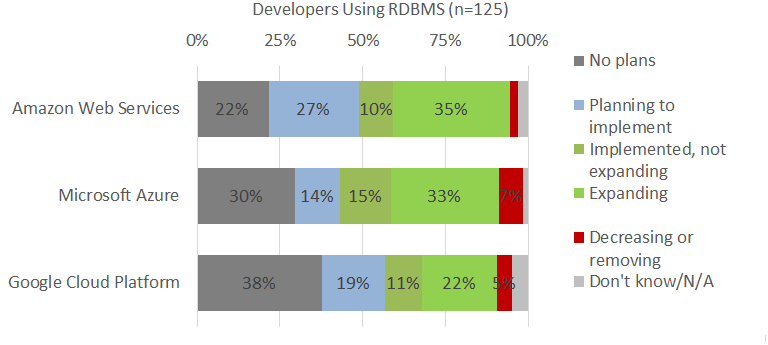Microsoft Hangs Tough with Cloud Data Developers
Microsoft may have been late to the cloud party, but its Windows Azure ranks near the top when it comes to popularity for data-related development, according to a new survey from Forrester.
The Forrsights Developer Survey, Q1 2013 found that North American and European developers preferred the Amazon EC2 cloud service for their compute services by a significant margin over Windows Azure, but it's a different story for Relational Database Management Systems (RDBMS) services.
"Microsoft and Amazon are neck and neck amongst users of cloud RDBMS," said Forrester analyst Jeffrey Hammond in a blog post yesterday.
The survey found that the top three types of cloud services adopted by developers are compute, storage and relational data services. Hammond said 47 percent of respondents regularly use compute and storage services, while 36 percent use RDBMS services. These numbers come from 325 developers in the North America and European regions (out of 1,611 total) who reported they had used cloud computing or elastic applications.
Of those respondents using cloud compute services, 62 percent said they were using Amazon EC2 or planned to expand their use of it in the next year. That compares to 39 percent for Windows Azure and 29 percent for the Google Cloud Platform.
That gap of more than 20 points in adoption "is well outside a standard margin of error, so we have to give the nod to AWS when it comes to compute," Hammond said.
"Things are very different when it comes to developers using cloud-based RDBMS services," Hammond said. There, 48 percent of developers reported they were "implementing and expanding" use of Microsoft SQL Azure, followed by 45 percent for the Amazon RDS service (see Figure 1). However, that 3-point gap is within the margin of error.
 [Click on image for larger view.]
Figure 1. Survey respondents using cloud RDBMS services (source: Forrester Research Inc.)
[Click on image for larger view.]
Figure 1. Survey respondents using cloud RDBMS services (source: Forrester Research Inc.)
"Also note that there are a high number of developers that are planning to implement Amazon's RDS service (27 percent) while 7 percent of Microsoft SQL Azure developers plan to decrease or remove their RDBMs workloads," Hammond said. "Overall, we'd have to rate this workload as a push--with no clear adoption leader."
The percentage of developers who reported using cloud storage and plan to expand that usage over the next 12 months was almost equally divided among Amazon Web Services, Windows Azure and Google Cloud Storage, at 25 percent, 22 percent and 23 percent, respectively.
"Amazon still has a larger body of developers that have implemented but are not expanding AWS S3 (17 percent compared to 10 percent for Microsoft Azure and 9 percent for Google, respectively)" Hammond said. "Our take: this workload looks like it's headed for a strongly competitive market in 2014."
So, despite a lag of about 4 years between the introduction of Amazon EC2 (August 2006) and Windows Azure (February 2010), Microsoft has caught up in attracting developers to its cloud platform. That's interesting news, considering the popular backlash about Microsoft's decision to not provide developers early access to the Windows 8.1 RTM.
What is it that makes Windows Azure database-related services so popular among developers? Comment here or drop me a line.
Posted by David Ramel on 09/05/2013